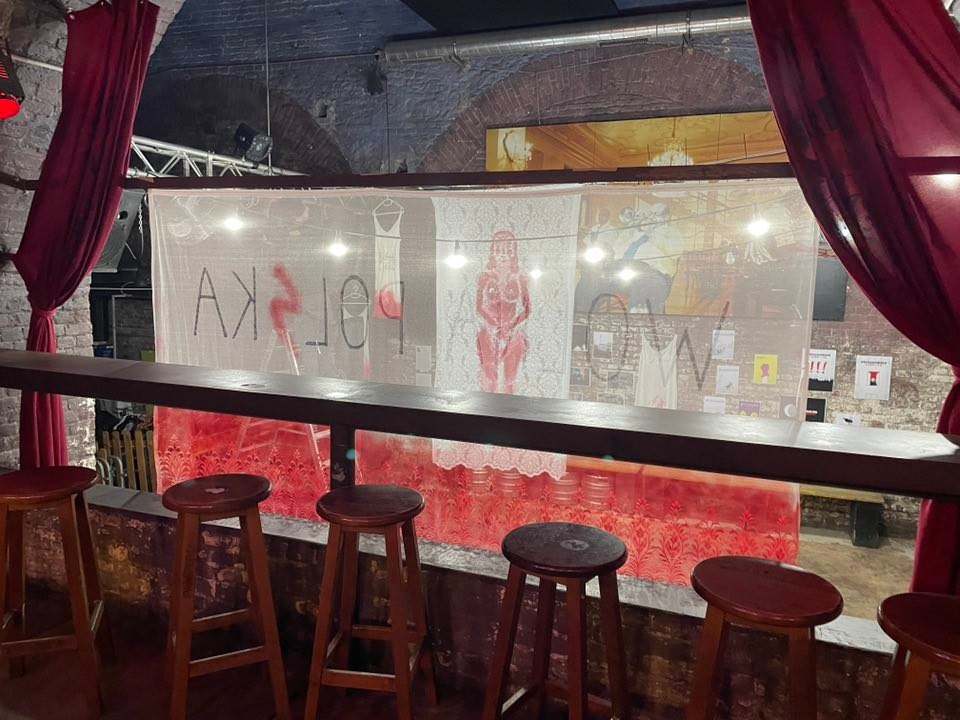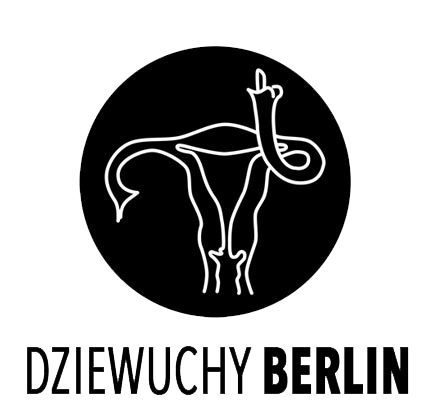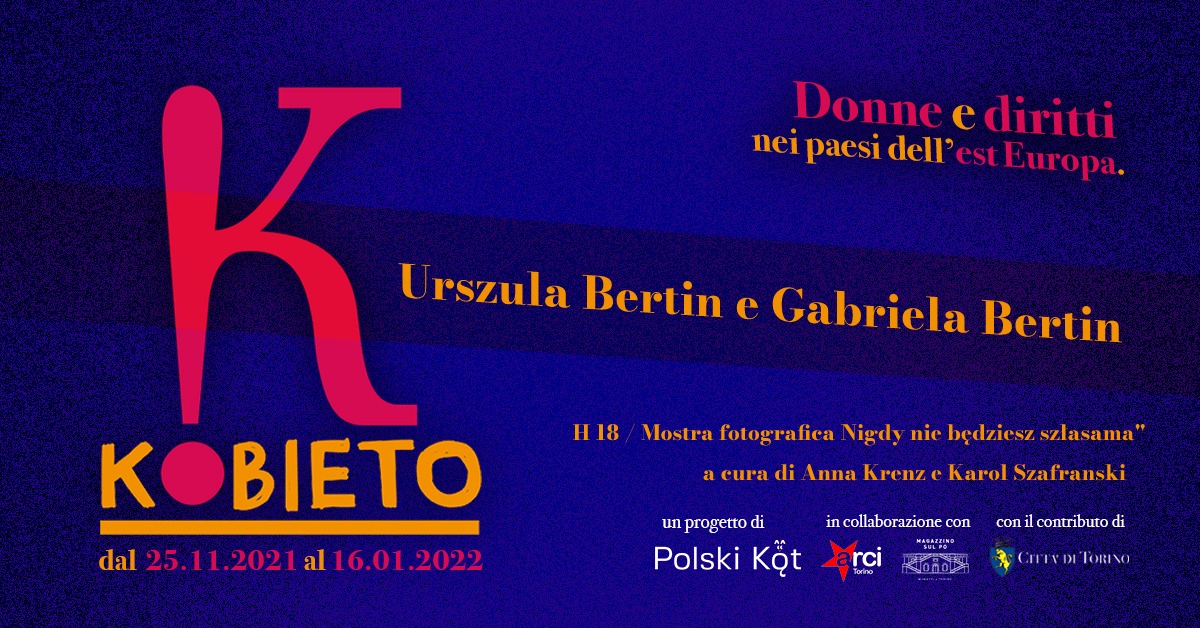KOBIETO! #5 – Mostra fotografica e performance artistica @Magazzino sul Po
19.12.2021 | 18.00 | Corso S. Maurizio, 52, 10124 Torino TO, Italien
Magazzino sul Po prezentuje / presents:
KOBIETO!
Wystawa fotografii / exhibition of Anna Krenz & Karola Szafrański
Występ artystyczny / artistic performance: Urszula Bertin
wyczuwalna była zbliżająca się eskalacja , decyzje rządu dotyczące wycofania wsparcia finansowego dla organizacji pozarządowych wspierających kobiece ofiary przemocy domowej to byla jedna z zapowiedzi dalszych działań. Na początku 2016 roku pozarządowa organizacja Ordo Iuris zaczęła zbierać podpisy pod projektem ustawy wprowadzającej kary więzienia dla kobiet i ginekologów. Projekt ten przewidywał rownież zezwalanie na prowadzenie dochodzeń w celu ustalenia, czy przyczyną rzekomego poronienia nie była aborcja wywołana przez środki poronne. Przedstawiciele rządu z premier Beata Szydło na czele , wyrazili swoje poparcie dla całkowitego zakazu aborcji.
Przez Polskę przetoczyła się fala protestów -Czarny Protest zorganizowanych przez Dziewuchy Dziewuchom oraz inicjatywę ustawodawczą Ratujmy Kobiety. W Berlinie również organizowałyśmy protest.
Tak sie zaczęło… i trwa , ta walka ciągle trwa…
Ale czy tylko demonstracje?
Sztuka odgrywa w tej walce ogromną rolę.
****
“You will never walk alone…”
The Polish law on abortion is one of the most restrictive in the European Union: the 1993 law, also known as the ‘compromise law on abortion’, allowed the termination of pregnancy only in cases of incest or rape, danger to the life or health of the woman, and an incurable genetic defect in the foetus: a de facto ban on abortion with three exceptions. For contraceptives, the State does not provide for tax deductions. Some doctors use conscientious objection to refuse treatment or services. Doctors often abuse their authority by not informing them of the foetus’ condition during examinations. Since the PIS (Right and Justice) took power, the issue of reproductive rights has worsened considerably. An imminent escalation was evident, and the government’s decision to withdraw financial support to NGOs that support women victims of domestic violence was one of the next steps.
In early 2016, the Ordo Iuris foundation began collecting signatures for a bill to introduce prison sentences for women and gynaecologists. This bill also envisaged authorising investigations to determine whether the cause of an alleged miscarriage was not a drug-induced abortion. Government representatives led by then Prime Minister Beata Szydło expressed support for a total ban on abortion. A wave of protests swept across Poland – the so-called Czarny protest ‘black protest’ organised by the foundation Dziewuchy Dziewuchom (‘Girls for Girls’) and the legislative initiative Ratujmy kobiet (‘Save Women’).
This is how this struggle began… and continues.
The end of 2021 is approaching, time for a retrospective, what has changed in these five years, what else has changed for us, how we have opposed it, expressed our anger, our solidarity. The demonstrations are a very important element of this struggle.
But are there only demonstrations?
Art plays a huge role in this struggle.
We present the works of Anna Krenz and Karol Szafrański.
****
All’inizio del 2016, la fondazione Ordo Iuris ha iniziato a raccogliere firme per un disegno di legge per introdurre pene detentive per donne e ginecologi. Questo progetto prevedeva anche di autorizzare indagini per determinare se la causa di un presunto aborto spontaneo non fosse un aborto indotto da farmaci. I rappresentanti del governo guidati dall’allora primo ministro Beata Szydło hanno espresso il proprio sostegno ad un divieto totale dell’aborto. Un’ondata di proteste ha travolto la Polonia – la cosiddetta Czarny protest “protesta nera” organizzata dalla fondazione Dziewuchy Dziewuchom (“Le Ragazze per le Ragazze”) e con l’iniziativa legislativa Ratujmy kobiet (“Salviamo le donne”).
Così è cominciata… e continua, questa lotta.
Ma ci sono solo le manifestazioni?
L’arte gioca un ruolo enorme in questa lotta.
Presentiamo i lavori di Anna Krenz e Karol Szafrański.
Facebook event: https://www.facebook.com/events/1769676146551646
POLSKI KOT
https://www.facebook.com/polski.kot
POLSKI KOT W TURINIE ODRADZA SIĘ DZIĘKI DWÓM MŁODYM KOBIETOM
Rozpoczęcie festiwalu “KobieTo!”, we współpracy z Arci Torino
Cel: opowiedzieć historię kobiet w krajach Europy Wschodniej. Pierwsza konferencja w dniu 25 listopada
Polski Kot z Turynu odradza się i robi to z młodym i kobiecym przewodnikiem: Daria Anna Sitek, 28 lat, Polka, która przeprowadziła się do Turynu w 2013 roku, nowa prezes, i Anna Mangiullo, pochodząca z Terra d’Otranto, która przybyła do miasta w 2014 roku, aby ukończyć studia z języka i literatury rosyjskiej, nowa wiceprezes. A pierwsza inicjatywa stowarzyszenia kulturalnego, które niedawno zdecydowało się dołączyć do Arci Torino, jest w imię kobiet i wielokulturowości. W rzeczywistości nosi on nazwę “KobieTo!” i ma na celu refleksję nad kondycją kobiet w krajach sąsiadujących z Europą Wschodnią. Migawka z udziałem ważnych gości, takich jak pisarki, artystki i aktywistki, na temat kondycji kobiet w krajach słowiańskich. Szerszym celem jest promowanie kultury słowiańskiej w Turynie, ze szczególnym uwzględnieniem kwestii praw obywatelskich i aktywnego obywatelstwa.
Nazwa projektu, “KobieTo!”, nawiązuje do gry słów pomiędzy językiem polskim a miastem Turyn: po polsku kobieta to Kobiéta. Kobieto to słowo deklinowane w wołaczu: ‘Hej, kobieto!’, dlatego. Imię wybrane w celu zwrócenia uwagi na kobiety. Co więcej, ostatnia sylaba KobieTo jest wyraźnym nawiązaniem do Turynu, gdzie projekt ma swoją siedzibę i do którego jest skierowany. Projekt jest realizowany przy wsparciu Miasta Turyn.
Polski kot narodził się w 2010 roku z pomysłu Alessandro Ajresa, nauczyciela języka polskiego i tłumacza. Początkowo było to tylko stowarzyszenie kulturalne, które pełniło rolę wizytówki Polski i słowiańskich realiów kulturowych. Rok później, 17 lutego 2011 r., przekształcił się w klub kultury, organizując kursy języka słowiańskiego, prezentacje książek, wystawy, koncerty, warsztaty, tematyczne aperitify i degustacje oraz różnego rodzaju imprezy kulturalne. Od 2015 roku Polski Kot stworzył Festival Slavika, pierwszy włoski festiwal w całości poświęcony kulturom Europy Wschodniej. Od początku istnienia Polski Kot co roku gościł włoskich i zagranicznych gości, wśród których znaleźli się m.in. laureatka Nagrody Nobla Olga Tokarczuk, polscy poeci Adam Zagajewski i Tomasz Różycki, chorwacka pisarka Dubravka Ugresič, bośniacki piosenkarz Damir Imamovič i dziesiątki innych. Z czasem nawiązała też ważne współprace z MOST-em, Kioskiem, Unione Culturale Franco Antonicelli, To je To, EastJournal, Radio Beckwith Evangelica i Russia in Translation. Istotny był również patronat katedry slawistyki na Uniwersytecie w Turynie.
Al via la rassegna “KobieTo!”, in collaborazione con Arci Torino
THE POLSKI KOT OF TURIN IS REBORN WITH TWO YOUNG WOMEN
At the start of the exhibition “KobieTo!”, in collaboration with Arci Torino
Objective: to tell the story of women in Eastern European countries. First conference on November 25
The Polski Kot of Turin is reborn and it does so with a young and female guide: Daria Anna Sitek, 28 years old, Polish who moved to Turin in 2013, the new president, and Anna Mangiullo, originally from Terra d’Otranto, who came to the city in 2014 to graduate in Russian Language and Literature, the new vice-president. And the first initiative of the cultural association, which has recently chosen to join Arci Torino, is in the sign of women and multiculturalism. In fact, it is called “KobieTo!” and aims to offer a reflection on the condition of women in the countries of near Eastern Europe. A photograph, built with important guests such as writers, artists, activists, on the condition of women in the Slavic countries. A broader objective, in fact, to promote Slavic culture in Turin, with particular attention to the issues of civil rights and active citizenship.
The name of the project, “KobieTo!”, refers to a play on words between the Polish language and the city of Turin: in Polish, the term for woman is Kobiéta. Kobieto is the word declined to the vocative: ‘Hey, woman!’, therefore. A name chosen to draw attention to women. Moreover, the last syllable of KobieTo is a clear reference to Turin, where the project is based and to which it is addressed. The project is realized with the support of the City of Turin.
The Polski kot was born in 2010 from an idea of Alessandro Ajres, Polish language teacher and translator. Initially it was just a cultural association that acted as a showcase for Poland and Slavic cultural realities. A year later, on February 17, 2011, it turned into a cultural club, organizing Slavic language courses, book presentations, exhibitions, concerts, workshops, themed aperitifs and tastings, and cultural events of various kinds. Since 2015, the Polski Kot has given birth to the Festival Slavika, the first Italian festival entirely dedicated to Eastern European cultures. Since its existence, the Polski Kot, every year, welcomes Italian and foreign guests: among them, it had the honor to host the Nobel Prize for Literature Olga Tokarczuk, the Polish poets Adam Zagajewski and Tomasz Różycki, the Croatian writer Dubravka Ugresič, the Bosnian singer-songwriter Damir Imamovič and dozens of others. Over time, he has also initiated important collaborations with MOST, Kiosk, Unione Culturale Franco Antonicelli, To je To, EastJournal, Radio Beckwith Evangelica and Russia in Translation. The patronage of the Chair of Slavistics at the University of Turin has also been essential.


